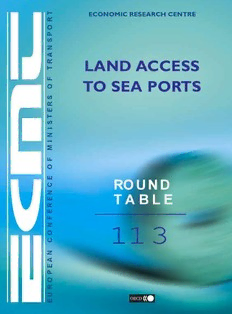
Report of the hundred and thirteenth Round Table on Transport Economics, held in Paris on 10th-11th December 1998 on the following topic : land access to sea ports. PDF
Preview Report of the hundred and thirteenth Round Table on Transport Economics, held in Paris on 10th-11th December 1998 on the following topic : land access to sea ports.
T ECONOMIC RESEARCH CENTRE R O P S N A R LAND ACCESS T F TO SEA PORTS O S R E T S I N I M F O E ROUND C N T A B L E E R E F N 11 3 O C N A E P O R U E © OECD, 2000. © Software: 1987-1996, Acrobat is a trademark of ADOBE. All rights reserved. OECD grants you the right to use one copy of this Program for your personal use only. Unauthorised reproduction, lending, hiring, transmission or distribution of any data or software is prohibited. You must treat the Program and associated materials and any elements thereof like any other copyrighted material. All requests should be made to: Head of Publications Division Public Affairs and Communication Directorate 2, rue André-Pascal, 75775 Paris Cedex 16, France. ECONOMIC RESEARCH CENTRE REPORT OF THE HUNDRED AND THIRTEENTH ROUND TABLE ON TRANSPORT ECONOMICS held in Paris on 10th-11th December 1998 On the following topic: LAND ACCESS TO SEA PORTS EUROPEAN CONFERENCE OF MINISTERS OF TRANSPORT EUROPEAN CONFERENCE OF MINISTERS OF TRANSPORT (ECMT) The European Conference of Ministers of Transport (ECMT) is an inter-governmental organisation established by a Protocol signed in Brussels on 17 October 1953. It is a forum in which Ministers responsible for transport, and more specifically the inland transport sector, can co-operate on policy. Within this forum, Ministers can openly discuss current problems and agree upon joint approaches aimed at improving the utilisation and at ensuring the rational development of European transport systems of international importance. At present, the ECMT’s role primarily consists of: – helping to create an integrated transport system throughout the enlarged Europe that is economically and technically efficient, meets the highest possible safety and environmental standards and takes full account of the social dimension; – helping also to build a bridge between the European Union and the rest of the continent at a political level. The Council of the Conference comprises the Ministers of Transport of 40 full Member countries: Albania, Austria, Azerbaijan, Belarus, Belgium, Bosnia-Herzegovina, Bulgaria, Croatia, the Czech Republic, Denmark, Estonia, Finland, France, FYR Macedonia, Georgia, Germany, Greece, Hungary, Iceland, Ireland, Italy, Latvia, Liechtenstein, Lithuania, Luxembourg, Moldova, Netherlands, Norway, Poland, Portugal, Romania, the Russian Federation, the Slovak Republic, Slovenia, Spain, Sweden, Switzerland, Turkey, Ukraine and the United Kingdom. There are six Associate member countries (Australia, Canada, Japan, New Zealand, Republic of Korea and the United States) and two Observer countries (Armenia and Morocco). A Committee of Deputies, composed of senior civil servants representing Ministers, prepares proposals for consideration by the Council of Ministers. The Committee is assisted by working groups, each of which has a specific mandate. The issues currently being studied – on which policy decisions by Ministers will be required – include the development and implementation of a pan-European transport policy; the integration of Central and Eastern European Countries into the European transport market; specific issues relating to transport by rail, road and waterway; combined transport; transport and the environment; the social costs of transport; trends in international transport and infrastructure needs; transport for people with mobility handicaps; road safety; traffic management; road traffic information and new communications technologies. Statistical analyses of trends in traffic and investment are published regularly by the ECMT and provide a clear indication of the situation, on a trimestrial or annual basis, in the transport sector in different European countries. As part of its research activities, the ECMT holds regular Symposia, Seminars and Round Tables on transport economics issues. Their conclusions are considered by the competent organs of the Conference under the authority of the Committee of Deputies and serve as a basis for formulating proposals for policy decisions to be submitted to Ministers. The ECMT’s Documentation Service has extensive information available concerning the transport sector. This information is accessible on the ECMT Internet site. For administrative purposes the ECMT’s Secretariat is attached to the Organisation for Economic Co-operation and Development (OECD). Publié en français sous le titre : LA DESSERTE TERRESTRE DES PORTS MARITIMES Further information about the ECMT is available on Internet at the following address: http://www.oecd.org/cem/ © ECMT 2001 – ECMT Publications are distributed by: OECD Publications Service, 2, rue André Pascal, 75775 PARIS CEDEX 16, France. TABLE OF CONTENTS INTRODUCTORY REPORTS NOTTEBOOM, T.E. (Belgium)..............................................................................................5 REYNAUD, C. (France)........................................................................................................57 MANGAN, J. (Ireland)..........................................................................................................89 VAN KLINK, H.A. (Netherlands).......................................................................................121 OTHER CONTRIBUTIONS............................................................................................................143 SUMMARY OF DISCUSSIONS (Round Table debate on reports).................................................................................................177 LIST OF PARTICIPANTS..............................................................................................................187 3 BELGIUM Theo E. NOTTEBOOM Department of Transport Economics and Policy University of Antwerp -- RUCA Antwerp Belgium 5 Detailed comments by Professor Willy Winkelmans (University of Antwerp -- RUCA) and Professor Eddy Van de Voorde (University of Antwerp -- UFSIA) are gratefully acknowledged. 6 SPATIAL AND FUNCTIONAL INTEGRATION OF CONTAINER PORT SYSTEMS AND HINTERLAND NETWORKS IN EUROPE SUMMARY 1. GENERAL CONSIDERATIONS ON LAND ACCESSIBILITY TO SEA PORTS.....................9 1.1. The functional role of sea ports and the triptych foreland-port-hinterland..............................9 1.2. The concept of land accessibility to sea ports........................................................................11 1.3. A multi-level approach to land accessibility..........................................................................12 1.4. Stakeholders ..........................................................................................................................13 1.5. The costs related to accessibility............................................................................................14 1.6. Some thoughts about proximity, centrality and location (locational level)...........................16 2. LAND ACCESS TO THE EUROPEAN CONTAINER PORT SYSTEM...................................19 2.1. Introduction............................................................................................................................19 2.2. A theoretical note on container port system and hinterland network development...............20 2.3. Empirical perspective on port system and hinterland network development.........................24 2.4. The (further) integration of container port system and hinterland networks.........................37 3. CONCLUDING REMARKS........................................................................................................46 NOTES..................................................................................................................................................48 BIBLIOGRAPHY.................................................................................................................................52 Antwerp, April 1998 7
